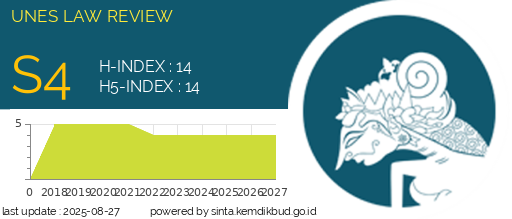Pemiskinan Koruptor Sebagai Alternatif Pidana Tambahan dalam Pemberantasan Tindak Pidana Korupsi di Indonesia Dikaitkan dengan Rancangan Undang-Undangan Perampasan Aset
DOI:
https://doi.org/10.31933/unesrev.v6i1.1170Keywords:
Corruption, Impoverishment, Asset Confication BillAbstract
In the latest research by Transparency International (TI) in 2022, Indonesia scores 34 out of a total of 100 and is ranked 110 out of 180 countries surveyed. This shows that responses to corrupt practices tend to be slow and even continue to get worse due to the lack of support from stakeholders. Efforts to formulate impoverishment crimes are one of the efforts in reforming criminal law in Indonesia. Impoverishment sanctions for corruptors are considered to be more effective in providing a deterrent effect than prison sentences. The formulation of the problem, namely: 1) What is the setting for impoverishment crimes against perpetrators of corruption as an alternative punishment for corruption 2) What are the obstacles faced in accepting impoverishment punishment as an additional punishment 3) How can the Asset Confiscation Bill accommodate the eradication of criminal acts of corruption in Indonesia. Normative juridical research approach. The research is descriptive analysis in nature, primary and secondary data sources, namely primary, secondary and tertiary legal materials, data were collected by means of library research. Data were analyzed qualitatively. The conclusion of the research results: The regulation of the crime of impoverishment against corruptors as an alternative punishment for corruption in Indonesia has not been regulated explicitly in the laws and regulations for eradicating corruption, where public prosecutors can confiscate and auction off corruptors' property originating from corruption as a substitute for losses of state money. At UNCAC 2003, confiscation of the assets of perpetrators of corruption can be carried out through criminal and civil channels. The criminal provisions contained in the Corruption Crime Eradication Law (UUPTPK) are considered unable to recover state financial losses, this is because, first, court decisions are not proportional to losses. Ideally, the calculation of state financial losses uses the concept of economic costs. The asset confiscation bill has a breakthrough needed by law enforcers to strengthen the legal system whereby asset confiscation is a crime without a court decision in criminal cases (non-conviction-based forfeiture). Through the Asset Confiscation Bill which has been initiated by the government, it is hoped that efforts to recover assets resulting from crime can be streamlined.
Downloads
References
Eddy O.S Hiariej, 2014, Prinsip-Prinsip Hukum Pidana, Cahaya Atma Pustaka, Yogyakarta
Elwi Danil, 2011, Korupsi Konsep, Tindak Pidana, dan Pemberantasannya, PT Raja Grafindo Persada, Jakarta
Jeremy Pope, 2007, Strategi Memberantas Korupsi Elemen Sistem Integritas Nasional, Yayasan Obor Indonesia, Jakarta.
Muhammad Yusuf, 2013, Merampas Aset Koruptor Solusi Pemberantasan Korupsi di Indonesia, Kompas, Jakarta
Soedjono Dirdjosisworo, 2008, Pengantar Ilmu Hukum, PT Raja Grafindo Persada, Jakarta.
Sugiyono 2017. Metode Penelitian Kuantitatif, Kualitatif, dan R&D, Alfabeta, Bandung.
T.J Gunawan, 2015, Konsep Pemidanaan Berbasis Nilai Kerugian Ekonomi, Genta Press, Yogyakarta.
Yenti Ganarsih, 2016, Penegakan Hukum Anti Pencucian Uang Dan Permasalahannya Di Indonesia , Rajawali Pers, Jakarta.
Undang-Undang Dasar Negara Republik Indonesia Tahun 1945
Kitab Undang-Undang Hukum Pidana
Undang-Undang Nomor 20 Tahun 2001 tentang perubahan atas Undang-Undang Nomor 31 Tahun 1999 tentang Pemberantasan Tindak Pidana Korupsi.
Rimawan Pradiptyo, Estimasi Biaya Sosial Korupsi, Makalah disampaikan pada FGD Biaya Sosial Korupsi: Telaah Konsep, Perhitungan dan Penerapannya di Indonesia, KPK, Jakarta 25- 26 Juli 2012
Romli Atmasasmita, 2007, Kebijakan Hukum Kerjasama di Bidang Ekstradisi dalam Era Globalisasi: Kemungkinan Perbahan atas Undang-Undang Nomor 1 Tahun 1979 tentang Ekstradisi, Makalah dalam Seminar Sehari Bersama: Perlunya Perubahan UU Nomor 1 Tahun 1979 tentang Ekstradisi. Diselenggarakan Oleh Kejaksaan Agung RI, Tanggal 20 November 2007, Jakarta.
Salman Luthan, Mencegah Praktek Korupsi di Daerah, Makalah disampaikan pada Seminar Nasional dan workshop dengan tema Pencegahan Korupsi dalam Penyelenggaraan Pemerintah Daerah di Indonesia diadakan oleh PSHK Fakultas Hukum UII Yogyakarta tanggal 19 Januari 2013, Yogyakarta.
Aradila Caesar Ifmaini Idris, Menghukum Ringan Koruptor (https://antikorupsi.org/id/article/menghukum-ringan-koruptor), diakses pada tanggal 10 Februari 2023, 21:46
Komisi Pemberantasan Korupsi, TPK Berdasarkan Tingkatan, www. KPK.go.id, diakses pada 10 Februari 2023 pukul 21:59
Koran SI, Pemiskinan Harus Jadi UU (https://economy.okezone.com/read/2012/03/06/436/587799/pemiskinan-harus-jadi-uu), diakses pada tanggal 10 Februari 2023, 22:48
KPK.Aset Koruptor, Mengapa Harus Disita?, https://acch.kpk.go.id/id/ragam/fokus/aset-koruptor-mengapa-harus-disita, diakses pada tanggal 11 April 2023 pukul 21.43
Machfoed Gembong, Pemiskinan Jadi Pilihan Hukuman Bagi Koruptor (https://antikorupsijateng.wordpress.com/2012/03/03/pemiskinan-jadi-pilihan-hukuman-bagi-koruptor/), diakses pada 10 Februari 2023, 22:16
Mochamad Zhacky, Idrus Mahram Bebas Usai Jalani Vonis 2 Tahun Bui (https://news.detik.com/berita/d-5169868/idrus-marham-bebas-usai-jalani-vonis-2-tahun-bui), diakses pada tanggal 10 Februari 2023, 22:39.
Yustinus Paat, CSIS: Miskinkan Koruptor Demi Efek Jera (https://www.beritasatu.com/news/349282/csis-miskinkan-koruptor-demi-efek-jera), diakses pada 10 Februari 2023, 22:20
Downloads
Published
How to Cite
Issue
Section
License
Hak cipta :
Penulis yang mempublikasikan manuskripnya di jurnal ini menyetujui ketentuan berikut:
- Hak cipta pada setiap artikel adalah milik penulis.
- Penulis mengakui bahwa UNES Law Review berhak menjadi yang pertama menerbitkan dengan lisensi Creative Commons Attribution 4.0 International (Attribution 4.0 International CC BY 4.0) .
- Penulis dapat mengirimkan artikel secara terpisah, mengatur distribusi non-eksklusif manuskrip yang telah diterbitkan dalam jurnal ini ke versi lain (misalnya, dikirim ke repositori institusi penulis, publikasi ke dalam buku, dll.), dengan mengakui bahwa manuskrip telah diterbitkan pertama kali di Jurnal UNES Law Review.



















